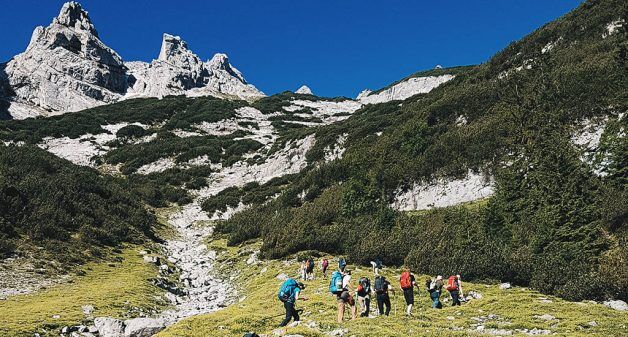
Kashmiris turn to eco-treks
The pandemic-induced reflectiveness means more Kashmiris are taking to the hills – becoming eco-conscious trekkers of the mountains they were once content to just look at.

The pandemic-induced reflectiveness means more Kashmiris are taking to the hills – becoming eco-conscious trekkers of the mountains they were once content to just look at.
Until a few years ago, a trek through Kashmir’s hills and mountains was not something that attracted many local people. Most were content to have the beautiful snow-clad peaks as their timeless backdrop.
Not anymore.
In the last two years there has been a significant increase in the number of treks to Kashmir’s idyllic mountain areas. The COVID-19 pandemic seems to have stirred not only a fitness-conscious streak in many Kashmiris, but a soulful reflectiveness towards the beauty – and fragility – of nature.
Bashir Ahmad is an ardent mountaineer and cyclist from north Kashmir’s Sopore town, who has been trekking for the past 12 years. Recently, he’s seen more young people take to the hills, which he puts down to an increasing awareness about its health and fitness benefits.
“Four or five years ago, we’d hardly come across any other group during our treks, now we meet many others,” Bashir Ahmad told Village Square.
It is little wonder that Sagg, an organisation which promotes ecotourism and other environment-friendly activities, has begun to organise more treks in the past three years.
Fayaz Ahmad, Sagg’s founder, said they get many entrepreneurs, academics, young people and even more women keen to trek nowadays.
“When you go to the woods and see the beauty and serenity of forests, you start valuing the forests and clean environment,” he said.
And there is a wonderful knock-on effect to this.
Nature’s knock-on effect
“We were overwhelmed by people’s response to trekking events we organised. If this trend continues it will automatically promote ecotourism and environmentalism,” said Fayaz Ahmad.
Ishfaq Tantray, a member of Varmul Trekking Club, agrees.
“During our treks to alpine areas in Pir Panjal Range, we’ve encountered several groups of young people who pitched their tents for a night’s stay. Another group spent five nights in the highland pastures,” he said.

Far from being disappointed by more people on the hills he once had to himself, Bashir Ahmad is happy about the increase in number of trekkers.
“In the long run, this will help them understand the importance of conserving nature,” he said.
Solace and soul-searching in time of conflict
Turning to nature for solace, he believes, is even more important in a place like conflict-hit Kashmir, where people have been living through insurgency-fuelled violence for over three decades.
No one has the power and resources to “treat us as satisfyingly as nature,” he added.
Government promotes trekking
Perhaps it is not surprising that the Forest, Ecology & Environment Department of Jammu and Kashmir is also promoting trekking.
“Enjoying the tranquillity of forests needs no wheels. Your feet should hit the ground to enjoy it,” said Irfan Rasool, a young forest conservator in J&K forest department, who often takes to social media in support of forest conservation.
His department is establishing trekking routes leading to different wildlife conservation reserves. Being a naturalist, he and his team only use natural resources found in the forest. Often wood from fallen trees are turned into benches dotted along the paths to provide idyllic rest-stops for the growing number of hikers.

The department has opened 35 rest houses and inspection huts in the forest regions of Kashmir and Jammu so far.
“These guest houses are located in idyllic settings. Until now they were used by forest department officers during official tours. But now they are open for nature lovers and trekkers,” said Rasool.
The trekking options now range from short day-long treks up and down mountain slopes to week-long trips, camping in stunning vistas amidst the native fauna and flora.
Potential for deeper tourism
“There is a lot of potential for adventure tourism in alpine areas. So, we are trying to use our existing infrastructure and involving local communities near the end-points, so that their infrastructure and services can also be used by tourists and trekkers,” said Mohit Gera, J&K’s principal conservator of forests.
He agrees that more people have realised the value of nature during the ongoing COVID-19 pandemic.
“But when you go to the forests, it’s much more than the trees – it’s a whole ecosystem,” he said.
His department is trying to give a stake to local communities in conserving forest resources, by involving them.
“There’s a growing realisation all over the world that relationship of humankind with nature is breaking. That’s why the emphasis is on restoring ecosystems,” he observed.
Athar Parvaiz is a Srinagar-based journalist.